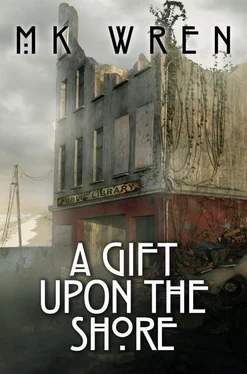I wonder how many of us are left in the world now.
Stephen asks, “What was Armageddon like here at Amarna?”
I look out at the clear, brilliant sky. “September fifteenth. Indian summer. That evening, Rachel and I watched the six o’clock newscast—the one that came to us via the new Federal Information Broadcasting System. I always wondered what bureaucrat came up with that title, if there was one among them who had a sense of humor. I mean, I can’t believe no one realized it would inevitably be abbreviated FIBS.”
Stephen smiles, but uneasily. “What did the newscast say?”
“Well, FIBS lived up to its acronym. Two days before, it had reported that cities were being evacuated in Russia, but on September fifteenth, Rachel and I—and the rest of the nation—were assured that negotiations were under way with the Russians, that the crisis was in fact over. So, we went out to the garden to pick zucchini and butternut squash. I remember a storm was coming in over the ocean from the southwest, but the sky was still clear in the east.”
“What did you see? How did you know what had happened?”
“We didn’t know. We only assumed. First we heard the FEMA warning siren from Shiloh Beach. It was so far away, we could barely hear it. Then suddenly it stopped. That’s when I looked at my watch. My digital watch. It had stopped, too. The numbers vanished. And in the eastern sky we saw the strange colors.”
“What… what were they like?”
I hesitate, trying to call up the words for those evanescent colors. They were no more amazing than what I see now in this sunset sky and in the mirrors in the sand. But before I can speak, I hear hurried footsteps behind me. Stephen turns, and I watch wariness take shape in his face.
“Stephen, what are you doing here?”
I look up at Miriam, and she looks down at me. She seems to expect me to answer the question. I remain silent, and Stephen rises.
“I’m just talking to Mary.”
“I can see that. You don’t have a lesson today. It’s the sabbath. Anyway, it’s time for bed. Go out and tell the other children.”
He nods, glances uncertainly at me as he goes to the door. When it closes behind him, Miriam asks, “What were you talking to him about?”
“About the End,” I answer flatly. “About Armageddon.”
“What do you know about Armageddon?”
She’s thinking of Saint John, of course. “Miriam, I know a great deal about it. I lived through it.” And she was born of the next generation. What I lived through is to her as much a legend, a mythic event, as Saint John’s revelation. To her it is Saint John’s revelation, whatever our Elder says, and however difficult it might be to explain the obvious discrepancies between revelation and reality. I wonder how she explains the fact that I survived. Only the blessed were supposed to survive her Armageddon.
Miriam’s lips part to speak, and I read in her eyes a rankling rage unmasked. I don’t know what I expect her to say, but I am for a moment afraid.
But it is never said. The rage is hidden behind cool indifference.
The children are coming in, faces flushed from their games. They each pause to wish me good night and kiss my cheek, then hurry past the kitchen and through the dining room to the basement door. Miriam turns and follows the children. I watch her until she disappears beyond the door, then I close my eyes to listen to the sounds of voices from the kitchen, the grinding of Bernadette’s pestle, the crackling of the fire, but there’s no warmth or peace here now.
At length, I look out at the beach. The color is almost gone. And I think about Stephen’s question: what was Armageddon like?
I don’t know what it was like anywhere else. I can guess, but I don’t know. Here, it was a day much like this one, except at the other end of the year.
And it was a day of terror beyond comprehension. After all these years, I still grieve for it.
But I don’t understand it. I will never understand it.
Every one of these hundreds of millions of human beings is in some form seeking happiness…. Not one is altogether noble nor altogether trustworthy nor altogether consistent; and not one is altogether vile. Not a single one but has at some time wept.
—HERBERT GEORGE WELLS,
THE OUTLINE OF HISTORY (1920)

When had night come?
Mary Hope tried to remember. Minutes ago? Hours? How much time had passed, and what time was it now?
Mary’s hand stirred abortively under the comforter. She didn’t make the error—again—of looking at her watch. It had stopped, its minuscule circuits burned out in one silent millisecond. In that same millisecond it seemed the circuits of her mind had been destroyed, grids of perception and comprehension charred to inert threads of ash.
Rachel’s old mechanical watch would still be working. They could be grateful for that.
Why?
What difference did it make what time it was now?
This was the end. Time didn’t matter. Or perhaps it was only the beginning.
What is it when there is no time?
No, that was ridiculous, to say something didn’t exist because the means to measure it had ceased to exist….
For all the time Mary couldn’t now measure—a few hours; it couldn’t be more—her mind had functioned erratically on two levels she couldn’t integrate. Neither the events of the last hours nor her thought sequences had imprinted themselves coherently in memory.
What am I doing here ?
Did she ask that aloud? No. It only seemed like a question that should be asked aloud.
She knew the answer. One part of her mind knew it. The other part couldn’t make sense of it.
The lithium-cell emergency light glowed atop a stack of cartons. Foolish to leave it on. They should save the batteries. At the foot of the basement stairs, like the debris of an avalanche, bedding, clothing, food, tools lay in shadowed mounds. Something pathetic about the light falling on a ceiling of cobwebbed floor joists; on pocked, concrete walls where the peeling whitewash made blighted patterns; on the yellow, sawed ends of stacked firewood; on the cast-iron Franklin stove; on shelves jumbled with dusty tools and scraps of lumber and pipes and loops of electrical wire and rusted paint cans wearing their colors in serrated collars of old drips—the detritus that basements collect over the years, the kinds of odds and ends that Rachel never threw away.
What were you keeping it for, Rachel ?
At least the old mattress and springs had proved useful. Mary made herself aware of herself, of exactly where she was, and knew that was what she’d been avoiding all these hours, wherever she was and whatever she was doing. She listened for her own heartbeat, for the sound of her own breath, and she thought, I am alive, I am here, this is now, and it is real .
Images flickered in the nether reaches of her mind: fire and blinding white caldrons of light, black bones of girders, towering monoliths warping, splintering, disintegrating.
She was alive, but her mother was dead. Everyone she had known in Portland was dead. The city was dead, and how many cities with it?
But she was alive.
At this moment, in this place, she was huddled with Rachel on the old mattress, buried under a down comforter, propped with pillows between them and the concrete wall. Rachel’s right arm was free of the comforter so she could stroke Shadow’s head, while Shadow panted her fear, ears back. Sparky lay at the foot of the bed, outwardly calmer, yet his eyes shifted constantly from Mary to Rachel. Beneath one of the small, high windows, sealed with boards except for the taped hole for the intake hose, Jim Acres’s filter pump thrummed like an insensate pulse. The air seemed heavy, turgid with the smell of dust and mold.
Читать дальше













